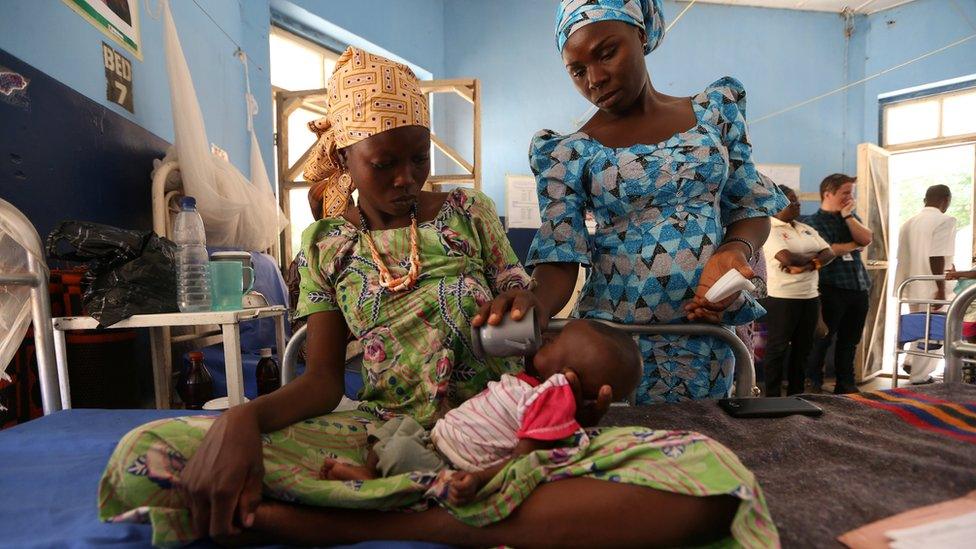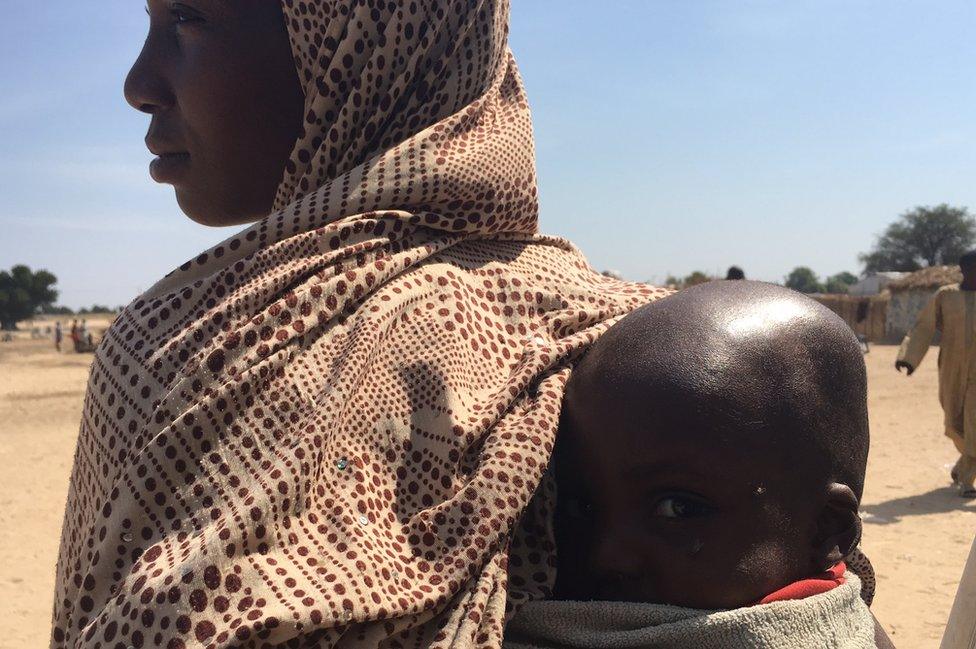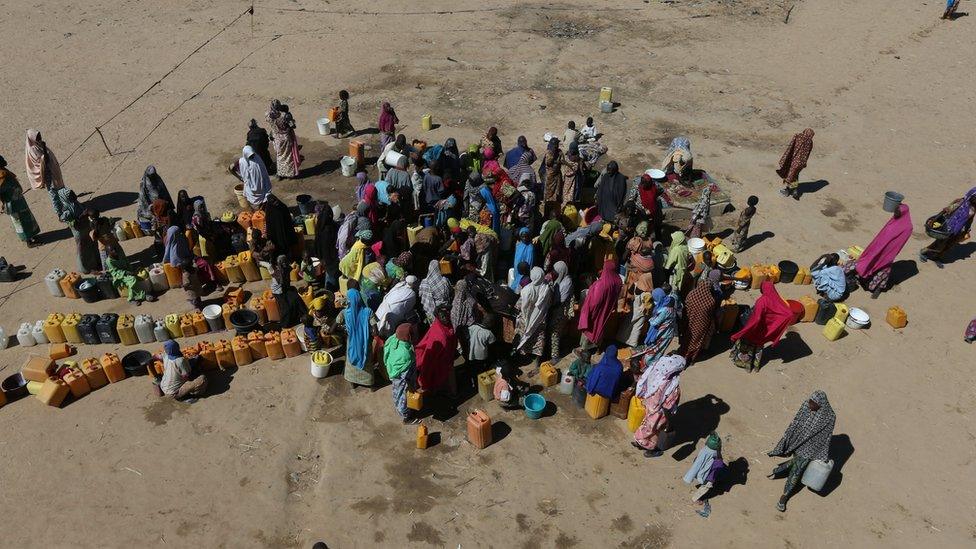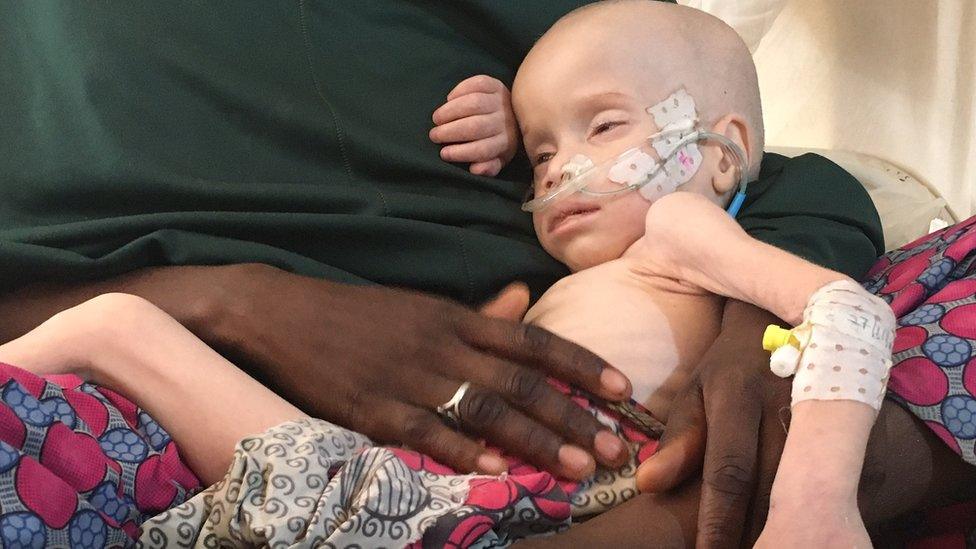Nigeria's Boko Haram crisis: 'We survived militants but face starvation'
- Published

Maiduguri has become the centre of aid efforts
Kawu Ashe is just one of up to 120,000 people facing starvation in north-eastern Nigeria, which has been ravaged by the Boko Haram Islamist insurgency.
Last month, she made the life-and-death decision to flee her village after militants delivered a chilling message: "We are coming back to take your son."
The insurgents killed her husband, a cattle trader, two years ago and were now insisting that the couple's two-and-a-half-year-old son Abdullahi belonged to them.
Ms Ashe knew she had to act - even if the penalty for trying to escape could be execution.

Abdullahi faces a serious risk of starvation
Under the cover of darkness, she and her two children and a younger sister walked through the bush for nine hours to safety.
But although Abdullahi survived the militants, he now faces another deadly threat - starvation.
He is among the estimated hundreds of thousands of children in north-eastern Nigeria currently suffering from severe acute malnutrition.
The UN describes it is as the "greatest crisis on the continent" and is appealing to the international community for more than $1bn (£793m) to deliver life-saving humanitarian assistance to almost seven million people in the region.
Abdullahi is skeletal. His body weight at 7kg (15lb) is around half of what it should be at his age.
"There was barely any food or clean drinking water in the village," said Ms Ashe, speaking at a Unicef malnutrition clinic set up in the region's main city, Maiduguri.
"Even if we did get some food the militants would take it away. Things are little better here. But I'm still struggling to feed my children."
Starvation could kill more people than Boko Haram
'It starts with the kids'
Last month, medical charity Medecins Sans Frontieres (MSF) said thousands of children had already died of starvation during the crisis.
The seven-year-long Boko Haram insurgency has laid waste to this region - killing thousands and forcing millions to flee their homes in north-east Nigeria and the neighbouring countries of Chad, Cameroon and Niger.
But as the Nigerian military pushes the insurgents from territory they once controlled, the sheer scale of the hunger and devastation is being revealed.
Frequent Boko Haram attacks mean farmers have been unable to plant anything in their fields for the third year in a row and aid convoys are ambushed on insecure roads.
There are allegations of wide-spread aid theft, which are being investigated by Nigeria's senate.

The UN says there is not enough money to fund the aid efforts
The military has also closed down markets because of security concerns but it means people have nowhere to buy food or to make a living.
The UN says millions are now reliant on food aid and there is simply not enough to go around.
"Without more international assistance, many more people are going to die" says John Ging, operations director for the UN Office for the Co-ordination of Humanitarian Affairs.
"It starts with kids because their parents have no means to actually take care of them," he says.
"We can do better than that in 2016 - it's a rich world. We need a very small fraction of those riches for international humanitarian action. At the moment we're not getting that small fraction."
'Bloated' with hunger
The city of Maiduguri is now the centre of the aid efforts. Its population is swollen by the hundreds of thousands of civilians who fled the violence and are now living in make-shift camps.
The worst cases of children suffering from starvation are brought to the MSF medical facility in the city.
In the intensive care unit, around a dozen severely emaciated children lay on beds.
They were hooked up to oxygen. Some had drips attached to their skulls as that was the only place the nurses could find a vein.
One of them is two-year-old Ali, who was born albino.
His mother Zara Mustafa said that her husband struggled to find work after they were forced from their home and they had no money to feed the family.
"Sometimes we don't eat for three days straight," she says.

Ali's family struggled to feed him when they were driven from their home by militants
In another bed lies one-month-old Mohammedu - his little body bloated my malnutrition. His mother, Aisha Umar has six other children.
"It's unbelievably difficult to get food here. I have to send my children out to beg," she says.
While the children are in a terrible state, they are at least getting some care.
There are still areas under the control of Boko Haram, which aid agencies cannot reach.
Conditions there will almost certainly be worse than those in Maiduguri.
And with the start of the dry season under way, yet more hunger is now on the horizon.

Boko Haram at a glance:

Boko Haram has sworn allegiance to Islamic State and often displays its trademark black flag
Founded in 2002, initially focused on opposing Western-style education - Boko Haram means "Western education is forbidden" in the Hausa language
Launched military operations in 2009
Thousands killed, mostly in north-eastern Nigeria, hundreds abducted, including at least 200 schoolgirls
Joined so-called Islamic State, now calls itself IS's "West African province"
Seized large area in north-east, where it declared caliphate
Regional force has retaken most territory in the last 22 months.
